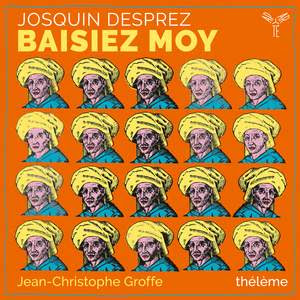Program: #21-38 Air Date: Sep 13, 2021
To listen to this show, you must first LOG IN. If you have already logged in, but you are still seeing this message, please SUBSCRIBE or UPGRADE your subscriber level today.
Before we leave the Josquin 500th services, we hear three recent takes on his work, including a radical reassessment of the composer as a pop icon updating the musical accompaniment to his music (Ondes Martinot!).
I. Mater Dolorosa: Music for the Feast of Our Lady of Sorrows (Mignarda) Mignarda CD mp014.

These concert programs are built upon the little-understood intersection of sacred and secular music of the late 15th century, a theme inspired in part by ideas that are distilled in The Flower of Paradise: Marian Devotion and Secular Song in Medieval and Renaissance Music, by David J. Rothenberg.
The programs vary, as do the wonderful artists who join us each year in mid-September to explore with voices, lutes, harp, or viol the many polyphonic and chant settings of the Stabat Mater Dolorosa, together with masses, motets, and even seemingly secular chansons which reveal themselves to have been dedicated to the Virgin Mary.
This album is a compilation of live recordings featuring Mignarda and our guest artists, all recorded live between 2016 - 2019 at Immaculate Conception Church.
Ron & Donna first met at "the Mac", singing together in the schola cantorum for the Latin Mass, and it seems fitting this year, when live concerts are so rare, for us to be able to share a taste of this evocative program in the glorious acoustic that suits our music so well.
-
- Stabat Mater dolorosa / Josquin des Prez (8:18)
- Recercare / Joan Ambrosio Dalza (1:21)
- Comme femme desconfortee / Gilles de Bins dit Binchois (7:41)
- Recercare prima / Vincenzo Capirola (3:10)
- De tous biens plaine / Hayne van Ghizeghem (3:07)
- Comme femme desconfortee / Alexander Agricola (3:15)
- Que vous ma dame - In pace in idipsum / Josquin des Prez (7:31)
- Christa si dedero / Jacob Obrecht (3:07)
- Stabat mater dolorosa / anonymous (9:46)
II. Josquin Desprez: Messes de l’Homme armé (Métamorphoses/Maurice Bourbon). Calliope CD CAL 9441.

The vocal group Métamorphoses sensibly allow the music to speak for itself much of the time. Their performances are unfussy and rarely indulge in extreme tempos of dynamic contrasts simply for the sake of variety. Tempos are generally on the brisk side, giving the imitative processes priority over the clarity of the contrapuntal textures.
In common with many Josquin recordings of recent years, and I'm thinking particularly of the excellent releases by Ensemble Clément Janequin, the choir here consists entirely of mature male voices. This is made possible by transposing each of the movements down by an interval determined by the modality. I don't quite understand this myself, but it is a practice that seems to be supported by the relevant scholarship. In terms of recording, it is something that has only really become practical in recent years, as the clarity of sound required to pick out the individual lines in these lower registers has only been with us for a decade or so.
1. Kyrie (4:41)
2. Gloria 6:53
3. Credo 7:07
4. Sanctus 7:52
5. Agnus Dei 8:23
Sexti Toni (30:31)
6. Kyrie 3:42
7. Gloria 6:18
8. Credo 8:03
9. Sanctus 5:07
10. Agnus dei 7:21
-
III. Josquin Desprez: Basiez-moy (Thélème/Jean-Christophe Groffe). Aparte CD AP259.
Josquin was one of the greatest composers of his time, the author of sacred and secular music and works for court and city. The ensemble Theleme and Jean-Christophe Groffe offer a bold and original interpretation of some of Josquin's songs. Combining the language of the Renaissance with very different sounds - ondes Martenot, Fender Rhodes piano, Buchla synthesizer - they create a lively and astonishingly fertile dialogue, in keeping with the spirit of the composer. Five hundred years after his death, this album pays tribute to a groundbreaking composer, whose innovations inspire us to this day.Baisiez moy
Fama malum
Dulces exuviae
Belle, pour l'amour de vous
La Bernardina (lute)
En l'ombre d'ung buissonnet
Qui belles amours a
Ri(cerca)da
Ecce tu pulchra es
Bergerette savoisienne
Guillaume se va chauffer / El grillo
Unisono 2
Nymphes des bois (Déploration sur la mort de Jean Ockeghem)
Je ris
Ut Phoebi radiis
Tant vous aimme
Mille regretz
Adieu mes amours
Plus nulz regretz
La Bernardina, a 3 (ondes Martenot)
Composer Info
Josquin Desprez, Joan Ambrosio Dalza, Gilles de Bins dit Binchois, Vincenzo Capirola, Hayne van Ghizeghem, Alexander Agricola, Jacob Obrecht,
CD Info
Calliope CD CAL 9441, Mignarda CD mp014, Aparte CD AP259
